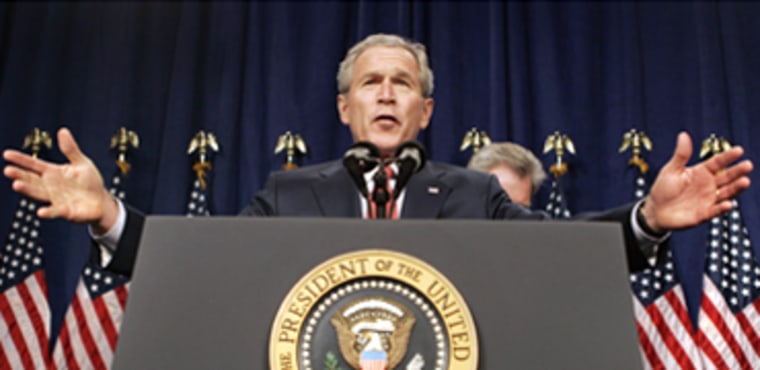As the fifth anniversary of the Sept. 11 terror attacks nears, President Bush is finding it increasingly hard to make good on foreign-policy promises or threats. The biggest source of his frustration is the "axis of evil" - Iran, North Korea and Iraq - that he warned four years ago imperiled world peace.
Bush faces a daunting number of simultaneous international crises as he tries to shore up flagging support at home for the Iraq war and roll back nuclear programs in Iran and North Korea.
Sectarian violence remains rampant in Iraq, suicide attacks are increasing in Afghanistan and a truce in southern Lebanon between Israel and Hezbollah guerrillas is wobbly. Iran and North Korea ignore his insistence that they must not have nuclear weapons. Syria turns a deaf ear to U.S. demands that it stop supporting terrorism.
Iranian indicator
A U.N. Security Council deadline came and went on Thursday for Iran to stop uranium enrichment, yet veto-wielding Russia and China are resisting Bush's call for stiff sanctions. Likewise, six-nation talks to restrict North Korea's nuclear program have been stalled for months.
Some analysts suggest Bush has overreached, or set the bar impossibly high, laying out goals he cannot achieve - while not acknowledging blunders.
"Spreading democracy, eradicating terrorism, ending Iran's nuclear potential. Those are huge goals. When one makes an assessment and sees that none of these is closer to being achieved, it becomes a real problem for America's credibility," said Shibley Telhami, a Mideast scholar at the University of Maryland.
The president strikes back
Bush asserted earlier this summer, "You know, the problem with diplomacy: It takes a while to get something done. If you're acting alone, you can move quickly." Ever since, diplomacy has only gotten harder.
The president has embarked on a series of speeches bracketing Sept. 11 and leading up to an address to the U.N. General Assembly later this month.
Likening the war against terrorism to struggles against World War II and Cold War foes, Bush told an American Legion convention on Thursday: "It is the decisive ideological struggle of the 21st century." He makes another speech in the series on Tuesday in Washington, D.C.
It's the administration's third public relations offensive in less than a year to try to rally support for the war.
Public opinion
Violence persists in Iraq as U.S. public opinion turns increasingly against the war, a big liability for Republicans on the ballot in November. More than 2,600 members of the U.S. military have died since the war began in March 2003.
Fully one-third of Americans think the terrorists may be winning the war, an AP-Ipsos poll suggested this week. It showed that Iraq worries have spilled over into the broader campaign against terrorists who directly target the United States. Half in the poll questioned whether the costs of the anti-terror campaign are too great, and even more admit that thought has crossed their mind.
Cooperation difficult
While Bush has declared a nuclear Iran "unacceptable" and has threatened sanctions, administration officials are already talking about a potential backup plan if the Security Council doesn't go along: assembling a separate coalition of countries willing to slap economic sanctions on Iran.
"There are just contradictions between goals and objectives and the reality of contemporary politics," said Stephen Wayne, a Georgetown University political scientist. "The fact of the matter is that Iran and North Korea having nuclear weapons is unacceptable. But that doesn't mean we're going to be able to do anything about it."
Meanwhile, in Afghanistan, the Taliban have increased suicide attacks, borrowing tactics from militants in Iraq. The escalation in the Taliban insurgency has stoked bitter fighting. More than 1,600 people, mostly militants, have died across Afghanistan in the past four months.
Bush jettisoned the go-it-alone bravado of his first term. But he is finding that working more cooperatively with European and other allies has not been particularly rewarding. And it's angered some hardline conservatives in his own party.
"The State Department has succeeded in the past year in making the Bush administration more Euro-friendly and U.N.-attentive than ever," wrote Bill Kristol, who worked in the first Bush White House and is now editor of the conservative Weekly Standard. "For this, the president has reaped no political benefit at home - and the dangers continue to mount abroad."
Lame duck president?
Nearly all two-term presidents have trouble advancing their agendas in their second terms. Bush also has failed to get key domestic initiatives through the GOP-led Congress, including Social Security overhaul and revamping immigration laws.
"What I see is a problem many administrations have, which is an unwillingness to acknowledge mistakes for fear that your political rivals will seize on them," said Jon Alterman, an analyst with the Center for Strategic and International Studies.
"The problem is, you find yourself backed into a corner supporting strategies that don't work," Alterman said.
